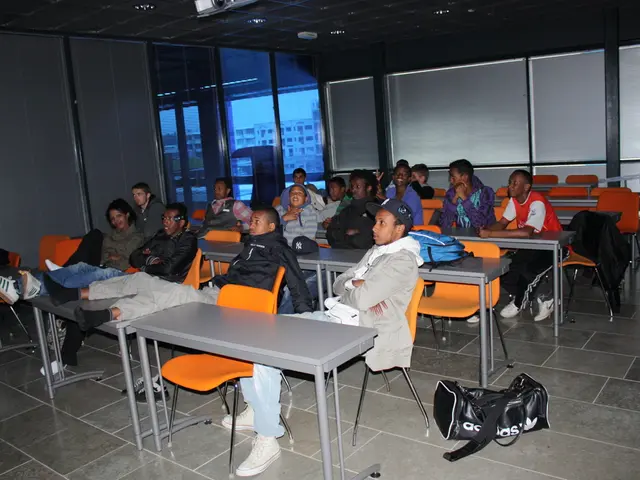School Massacres: A Transatlantic Conundrum
US school violence, once considered an American societal issue, now escalating as a prevalent problem across Europe.
In the modern world, the imagery of a school shooting - once solely associated with American soil - is steadily seeping into the European landscape. According to criminal expert Adam Lankford, this disturbing paradigm shift is precipitated by American mass shooters serving as tragic role models for their counterparts in Europe.
The chilling echoes of gunfire have reverberated through school walls in Western Europe, claiming innocent lives. In just the past two years, four of the deadliest school attacks have occurred: two in Sweden and Austria within this year alone, adding haunting chapters to their respective countries' histories.
The Latest Tragedy in Graz
The latest atrocity unfolded in the idyllic Austrian city of Graz, where a 21-year-old gunman took the lives of 10 schoolchildren and teachers. Shockwaves rippled through the community, stoking talks of better security as the specter of a former American phenomenon now looms over European schools.
The unsettling history of school shootings, previously predominant in the US, is being mirrored across the Atlantic. Lankford underscores the Columbine High School massacre in 1999 as an influential catastrophe, with its echoes resonating with European perpetrators.
The Political Fallout
Faced with a growing threat, European governments are stepping up their response. Sweden tightened gun control measures, banning certain semi-automatic weapons and strengthening gun permit procedures, in the aftermath of their deadly school tragedy earlier this year. Similar discussions are ongoing in France, where President Emmanuel Macron seeks EU-wide legislation restricting social media access for children under 15 following a school knife attack.
The Czech Republic and Beyond
Tightening gun laws has been a continual response to school shooting incidents across the continent, with the Czech Republic, Croatia, Germany, and Finland introducing new regulations or strengthening existing measures. Finland, for instance, has taken steps to prepare students in the event of an attack, such as training them to barricade classrooms and implement stricter penalties for carrying weapons in public spaces.
The Shifting Landscape
The European response to school shootings mirrors the evolution of such incidents from a US phenomenon to a transatlantic concern. While the frequency of school shootings remains significantly lower in Europe, increased vigilance and tightened security measures underscore the growing global awareness and response to the threat.
Paralleling this shift is the ever-present concern over radicalization and terrorism, as exemplified by the Islamist terror threat in countries like Germany. This widening scope of violence underscores the urgent need for comprehensive security strategies capable of adapting to the evolving threats of the 21st century.
Meanwhile, the delicate balance between security and individual freedoms will continue to challenge policymakers and societies alike, as they navigate the complex path toward creating safer environments for children and adults alike.
From the Sidelines: Austria's National Football Team
In the wake of the Graz tragedy, Austria's national football team effectively voiced their collective grief, with a poignant statement expressing their dismay at the events unfolding in their own backyard. The team remains a unifying symbol of national pride, but in the shadow of this tragedy, they also serve as a poignant reminder of the complicated bond between safety, responsibility, and unity in modern society.
Austria's Path Forward
In the aftermath of the devastating school shooting, calls for stricter legislation are growing louder in Austria. The nation's comparatively high rate of private gun ownership, relative to other European countries, presents unique challenges in implementing new measures aimed at strengthening safety, while preserving individual rights and tradition.
President Alexander Van der Bellen has signaled his openness to changes following the tragic school shooting in Graz, emphasizing the need to strike a delicate balance between safety and individual liberties. Meanwhile, Chancellor Christian Stocker urged calm and warned against rushing to judgment, insisting that action should be guided by sound investigations rather than reactionary impulses. Interior Minister Gerhard Karner categorically stated that the country cannot and will not move on from such a heinous act.
Political scientist Peter Filzmaier sheds light on the intricate network of interest groups influencing Austria's gun control discourse, comprising hunting, sports shooting, and traditional associations. Realistically, Filzmaier suggests, only targeted tightening of acquisition, control, and psychological examination procedures may garner broad political support.
As Austria grapples with the pain and consequences of this tragic event, the nation must navigate a course between the pressing need for increased safety and the preservation of its distinct cultural and traditional identities. This delicate dance lies at the heart of the choate challenge facing nations around the world as they work to ensure the safety of their citizens in the face of growing transatlantic threats to tranquility and security.
- The community policy in response to the school shooting in Graz, Austria, is focusing on better security measures, such as tightening gun control and strengthening gun permit procedures, to prevent future tragedies.
- Paralleling the increase in school shootings across Europe, the need for education and self-development in the realm of politics and crime-and-justice is becoming more pertinent, with a focus on understanding the root causes of radicalization and terrorism, and developing comprehensive security strategies for the 21st century.







